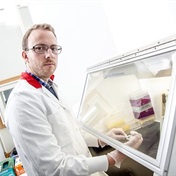For the first time, researchers have been able to identify what is "normal" when it comes to the microorganisms living in and on the human body.
According to 14 new studies being published in the journal Nature and several Public Library of Science journals, the human "microbiome" consists of more than 10 000 microbial species and 8 million microbial genes, most of which co-exist happily with humans to their mutual benefit.
"This is giving us a picture of what a healthy individual looks like," said Jeffrey Cirillo, a professor of microbial and molecular pathogenesis at Texas A&M Health Science Center College of Medicine in Bryan, who was not involved with the study.
Scientists hope that knowing what "normal" looks like will one day help scientists prevent and treat diseases.
How the study was done
Little has been known about the inhabitants of the various parts of the human body because it's difficult if not impossible to grow most of the bacteria found there, Dr Eric Green, director of the National Human Genome Research Institute, said. But the advent of new and cost-effective DNA sequencing techniques now allows researchers to sample and identify microorganisms directly from the human body.
This massive five-year project involved 240 healthy adult volunteers in St. Louis and Houston. Researchers took samples from 15 sites in men and 18 sites in women, including the mouth, skin, nose, vagina and lower intestine.
The researchers counted more than 10 000 species of microbes in the body and as many as 10 bacterial cells for every human cell. In a 200-pound adult, that amounts to between two and six pounds of bacteria, Green said.
The 8 million or so genes from these microbes (compare that to only 22 000 in the normal human genome) "play a critical role in our development and health," said Bruce Birren, director of the Genomic Sequencing Center for Infectious Diseases and co-director of the Genome Sequencing and Analysis Program at the Broad Institute of MIT and Harvard.
Interestingly, bacteria in one part of the body are very different from those in another, with the most diversity found on the skin.
Microbes also differed greatly from individual to individual, suggesting that people might have their own unique "microbial signatures."
What the research showed
Although the actual organisms might be different, the functions they perform stay the same.
"They have the same core functions," said Birren. "We don't all have the same bacteria, although they all seem to have been organised to do similar things."
Confirming previous suspicions, the researchers found that even healthy people harbour certain levels of harmful bacteria. The challenge now is to figure out how and why they become dangerous and cause illness.
"This is really a new vista in biology," said Dr Phillip Tarr, director of paediatric gastroenterology and nutrition at Washington University School of Medicine in St. Louis. "This opens up many, many new opportunities to improve the health of our population."
One paper in the series looked at how microbes in the intestine might be linked to necrotizing enterocolitis, a gastrointestinal illness in premature babies that can kill up to one-third of its victims.
"These bacteria are not passengers," Tarr explained. "They are metabolically active as a community and we now have to reckon with them much as we have to reckon with an ecosystem in a forest or a body of water. We're moving out of old paradigm of one germ one disease one person and more into the paradigm of how the microbial community affects both health and disease."
Cirillo added: "This is a huge study, the most comprehensive I've seen, particularly in healthy individuals. It's going to set a foundation for a lot of future work."
Read more:
DNA tests: For which diseases?
More information
The U.S. National Institutes of Health has more on human microbiota.
(Copyright © 2012 HealthDay. All rights reserved.)




 Publications
Publications
 Partners
Partners















